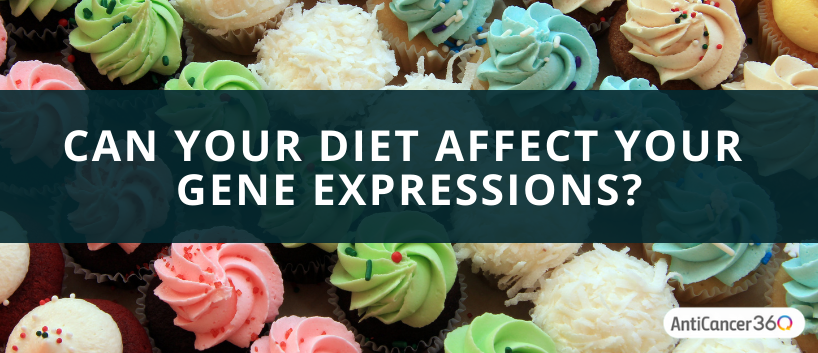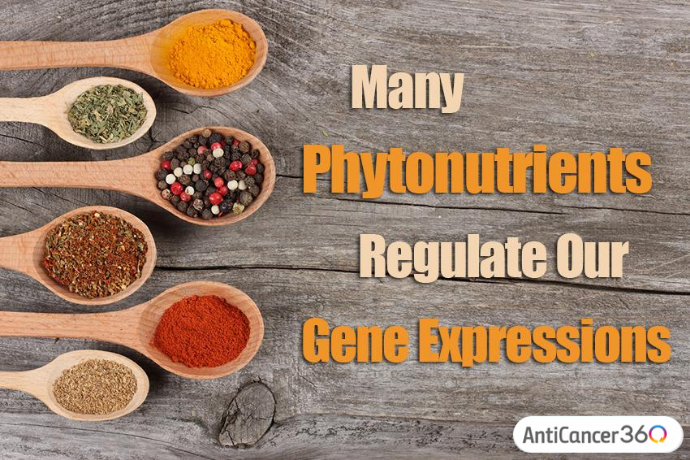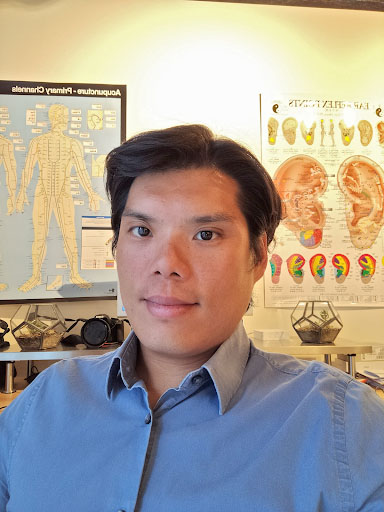When we think of our “genes” we usually think of things like hair color, eye color, height, and other aspects of our bodies that we really can’t control.
But while we can’t control our genetic code, we CAN control how our genes express (i.e. which genes are “turned on” or “turned off.”) This is called “epigenetics” and can be affected by our environment, including the foods that we eat.
The study of diet in relation to epigenetics is called “nutrigenomics,” and this field of study is making some remarkable discoveries. And the way your genes express doesn’t just affect your health…. it can also affect the health of your future children.
So today we’ll show you some examples of how your diet can affect your gene expressions… AND what you can do to maintain your genetic health.
Carbohydrate Rich Diets Can Over Stimulate Certain Genes
One of the big controversies in health today, is the topic of dietary carbohydrates. High carbohydrate foods include anything that is high in sugar and/or starch (i.e. bread, rice, potatoes, cereals, noodles, pasta, fruit, etc…)
Some high carbohydrate diet are definitely healthier than others. Many fruits, vegetables, and whole grains for example, are very rich in carbohydrates. But unlike refined and processed carbohydrates, they also come with health promoting fibers and phytonutrients.
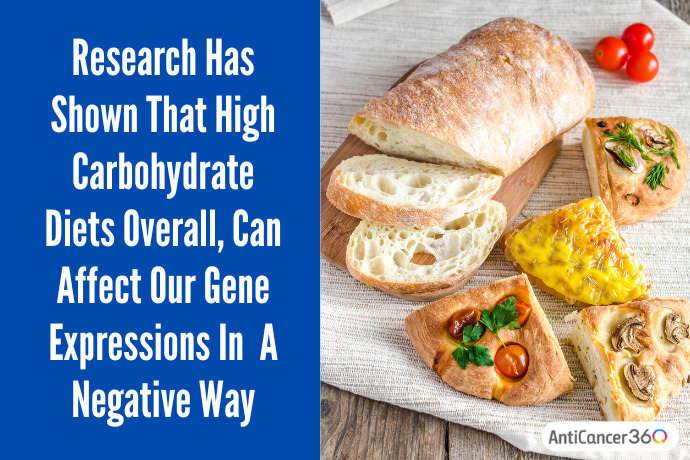
But that being said… research has shown that high carbohydrate diets overall, can affect our gene expressions in a negative way. Norwegian researchers found that a diet which is 65% carbohydrate can overstimulate groups of genes involved in inflammation… and diseases like Alzheimer’s, type 2 diabetes, cardiovascular disease, and cancer [1],[2].
To put this in perspective… the “official recommendation” for carbohydrate intake is between 45 and 65% of total calories [3]. So 65% is a pretty common level of carbohydrate intake. The people in this study also consumed a diet of 15% protein and 20% fat, in addition to the 65% carbohydrates.
But when these researchers switched their patients to a diet of 30% carbohydrates, 40% protein, and 30% fat, they found that these gene expressions changed for the better in just 6 days.
Now if you have a certain illness, there may be times when you’d want to use a diet that’s very low in carbohydrates… or relatively high in whole food carbohydrates.
But if you are generally healthy, and want to stay that way…. it is best to eat a moderate carbohydrate diet, that is relatively higher in fat and protein. This will help your genes express in a balanced way.
Phytonutrients Can Also Affect Gene Expression
Beyond the amount of carbohydrates and sugar that you put in your body, many plant chemicals (phytonutrients) can also affect your gene expressions. This is why it is so important to include plenty of vegetables, spices, and herbs in your diet overall.
A recent example of this was a study showing that green tea could alter the expression of certain genes in women. These genes in particular were related to estrogen metabolism and cancer [4].
Other studies have shown various phytonutrients to have a variety of epigenetic effects… especially relating to things like inflammation, cellular aging, and cancer [5]. These include:
- Curcumin: found in turmeric spice, which is commonly used in curry.
- Gallic Acid: found things like black tea, blackberries, cloves, oregano, chestnuts, and chicory.
- Resveratrol: famous for being in red wine… but also found in foods like blueberries, dark chocolate, and peanut butter.
- Anacardic Acid: mostly found in cashew nuts and cashew fruits, but also in mangoes.
- Genistein: a phytoestrogen found in soy.
The takeaway from all this is that MANY plant foods are constantly affecting our gene expressions. And there is still MUCH to be discovered in this field of study.
In a senses, our bodies are supposed to be constantly “medicated” by nature, through the foods that we eat.
So ultimately, if you want to optimize your gene expressions with your diet… make sure to include a higher volume of many different plant foods in your diet.
Your Diet Can Affect Your Future Children
Most people want to improve their diet for their own health and quality of life.
But did you know? Your diet you could actually affect your future children…
In this case we’re mostly talking about future mothers, and what they eat when they are pregnant. But this can definitely also apply to the father also.
Animal studies have shown that eating a particular diet before and around the time of conception, can affect the “epigenetic inheritance” passed on to the next generation. To put it simply, your diet could affect how your child’s genes are expressed.
And depending on the diet, this epigenetic inheritance can be for the better, or worse.
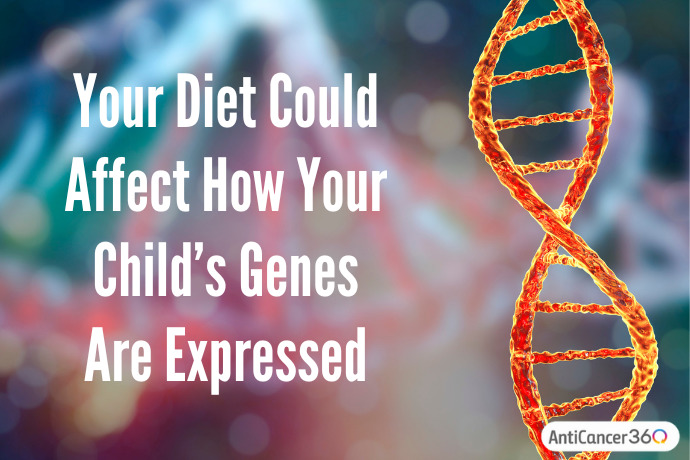
Eating a diet that is too high in fat for example, could increase the risk of obesity and diabetes in your children [6]. This risk occurs because of epigenetic changes passed down to the children from both the father and the mother. The risk of obesity in this study came from both mother and father, and was greatest when both parents were obese. The risk of diabetes on the other hand, was more dependant on the mother’s diet.
Important Note: The “high fat diet” used in this study was also high in sugar. In fact, nearly ALL the carbohydrate in this high fat diet was from sugar. So essence, it was really a “high fat + high sugar + higher overall calorie diet” that caused these problems. New research is showing that a high fat diet is really only a problem, when the person is also eating a lot of carbohydrates… especially sugar and refined carbohydrates [7],[8].
But while overeating fat and sugar can increase the risk of obesity and diabetes in your children… eating TOO LITTLE protein during pregnancy could cause your child to be smaller, regardless of their diet after they are born [9].
So as with many things in life, balance is the key.
Human research has also shown that the mother’s diet can also affect how their children behave.
When researchers looked into the diets of mothers whose children suffered from ADHD and behavioral issues, they found an association with poor prenatal nutrition. They found that eating a diet that is too high in sugar and fat from processed foods, was associated with epigenetic changes thought to be involved in ADHD [10].
So if you are planning to have a child, or are already pregnant… eating a healthy diet is more important than ever.
A “Healthy” Diet Can Be VERY Enjoyable
There’s so much information about health, diet, and nutrition that you could keep learning about it forever.
But, none of this information matters if you don’t apply it to your own diet.
This is a problem that I think about often, because…
On one hand, you have people who are really interested in certain diets (paleo, macrobiotic, gluten free, low carb, ketogenic, vegan, etc..). Many will advocate a certain diet because it was beneficial for them individually, or because of a certain set of beliefs.
But then there is everyone else… people who just “eat normally.” For many of these people, it would be unimaginable to adopt one of these specialized diets… let alone stick to it long term.
Fortunately, you can eat a “healthy” diet, that’s pretty normal too…
Specialized diets can definitely benefit people with certain health situations, and/ or health goals….
BUT… for your average person who is generally healthy, and wants to stay that way… a good guideline for your diet is to eat ⅓ carbohydrates, ⅓ protein, and ⅓ fat. For most people, this means cutting their carbohydrates in half (i.e. a moderate carbohydrate diet), and increasing their intake of fat.
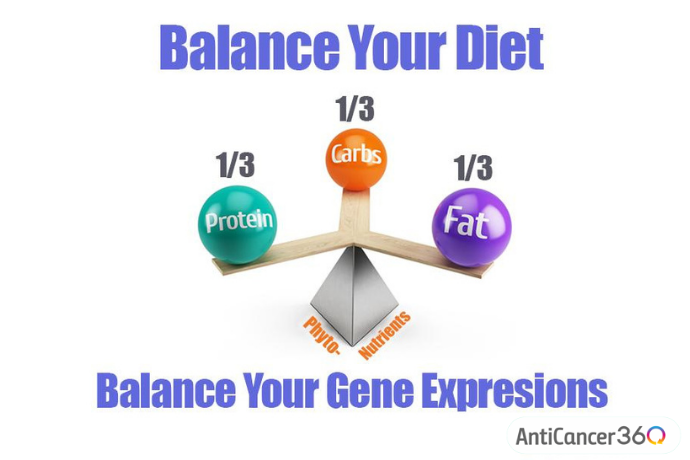
And if you think about it, this gives you lots of opportunities to make meals that taste good (and I mean to everyone… not just to “health nuts.”)
The reason I say this is that most of us like to eat our carbohydrates, proteins, and fats together.
Here’s an example… A meal of chicken, rice, and vegetables is ok (high carb, low fat). A meal of chicken, vegetables, and butter is ok also (high fat, low carb).
But MOST people would prefer a meal with chicken, rice, vegetables, AND butter…
Fortunately, new research is showing us that even a meal like this can be healthy. But if you are going to eat like this… here are some things that you’ll want to remember:
- You should reduce carbohydrate portion to about half of what you’d normally eat… (If you don’t do this, increasing fat in your diet could hurt, rather than help.)
- When you reduce your carbohydrates, you can increase the amount of fat you eat. This even includes things like butter, sour cream, (unsweetened) cream, and fatty meats. Just make sure to get naturally produced versions of these products (i.e. grass fed, pasture raised, organic when possible, etc…).
- Other great sources of fat to prioritize include olive oil, coconut oil, avocados, walnuts, flax, chia seeds, and fatty fish.
- Choose whole grain sources of carbohydrates (i.e. brown rice, whole grain bread, etc…). Beans and other legumes (chickpeas, lentils, peas) should also be prioritized as a carbohydrate source.
- Avoid sugar and refined carbohydrates overall (i.e. white bread, white pasta, etc…). And when you do eat these foods, eat them in very small amounts (i.e. a few bites) at the end of a meal.
- Choose whole fruit over fruit juice.
- Increase the amount, and variety of vegetables, herbs, and spices in your meals.
For most people, these guidelines are pretty easy to follow. It also allows you to create a sustainable diet, that will easily fit with your lifestyle. Many people find that eating like this makes their meals even tastier than before.
Best of all, it will help you balance your gene expressions, and keep you healthy over time.
Are You A Candidate For Our Program?
If you’d like to learn more about the AntiCancer360 approach and see if we can help you… please watch our free online webinar to learn more about our approach. Then at the end, you’ll be able to schedule a free call with someone from our team so that we can discuss your case in more detail.
Citations:
Gene Wei is a Board Certified Doctor of Oriental Medicine in the state of Florida, and the founder of AntiCancer360. He’s also a graduate of the University of California Los Angeles, and East West College of Natural Medicine.
His practice is focused on integrative and natural anticancer strategies. Over the years, he’s helped many people overcome difficult cancers… including some cases of “terminal cancer” which were able to be reversed with an “Aggressive Integrative Approach.”

